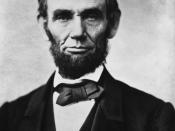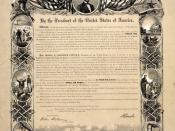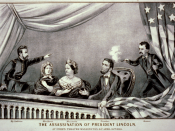In November of 1860, Abraham Lincoln, later coined the Great Emancipator, was elected President of the United States. This election caused a major outrage within the Southern states that ended in an overall secession of the Lower South, including. The outrage occurred mainly over the battling crisis of slavery and Lincoln's actions to prevent the Confederacy from gaining control of the Union, the United States. This upheaval is what led to Lincoln's marked change of policy. In his inauguration, as stated in the question, Lincoln assured his citizens by implementing the statement of having no purpose of interfering with the establishment of slavery in the states where it existed. However, as upcoming pressures from the feuding sections got more strenuous, He was forced to convert his plan of action and eventually issue a preliminary document of emancipation.
President Lincoln initially confirmed that his official presidential purpose was to aid in the preservation of the Union, not emancipation of slavery, meaning that he wanted the United States to be a whole without a split of sections, those being the Confederacy (Seceded states of the U.S.)
and the Union (remaining states of the U.S.). The overall issue of what to do with Southern slaves, on the other hand, was the problem that kept shadowing his popularity. He adopted the position that the Slave Power had to be destroyed, and the best means of doing so was to free the slaves. Lincoln realized that the growing uproar to abolish slavery threatened to endanger the support he needed to act against the war and preserve the Union. To gain support for an emancipation resolution, Lincoln used statements like: if all of the slaves were purchased from all of the border states the government would be spending approximately half the cost that it would...


